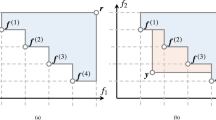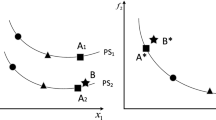Abstract
Multimodal multiobjective optimization (MMMOO) can be perceived as the combination of multiobjective optimization (MOO) and multimodal optimization (MMO). The performance of an MMMOO method should be thus assessed from both perspectives, leading to the prevalence of dual-metric indicators in the existing literature. This study first analyzes the ideal outcome of MMMOO for informed decision-making to determine the prerequisites of a theoretically and practically sound performance indicator. Then, it critically evaluates existing indicators, especially those that intend to measure success from the MMO perspective. Subsequently, it introduces Aggregated Partial Hypervolumes (APHVs) as a novel overall parametric performance indicator that not only addresses the drawbacks of existing ones but can also reflect the relative importance of MMO for the decision-maker. Finally, a few descriptive MMMOO examples are studied to verify that the optimal population according to APHVs matches our understanding of the ideal outcome of MMMOO, taking into account the relative importance of both the MMO and the MOO perspectives.
Access this chapter
Tax calculation will be finalised at checkout
Purchases are for personal use only
Similar content being viewed by others
References
Purshouse, R.C., Deb, K., Mansor, M.M., Mostaghim, S., Wang, R.: A review of hybrid evolutionary multiple criteria decision making methods. In: 2014 IEEE Congress on Evolutionary Computation (CEC), pp. 1147–1154. IEEE (2014)
Tanabe, R., Ishibuchi, H.: A review of evolutionary multimodal multiobjective optimization. IEEE Trans. Evol. Comput. 24(1), 193–200 (2019)
Liang, J., Yue, C., Li, G., Qu, B., Suganthan, P., Yu, K.: Problem definitions and evaluation criteria for the CEC 2021 on multimodal multiobjective path planning optimization (2020)
Schutze, O., Vasile, M., Coello, C.A.C.: Computing the set of epsilon-efficient solutions in multiobjective space mission design. J. Aerosp. Comput. Inf. Commun. 8(3), 53–70 (2011)
Preuss, M., Kausch, C., Bouvy, C., Henrich, F.: Decision space diversity can be essential for solving multiobjective real-world problems. In: Ehrgott, M., Naujoks, B., Stewart, T., Wallenius, J. (eds.) Multiple Criteria Decision Making for Sustainable Energy and Transportation Systems. LNEMS, vol. 634. Springer, Berlin, Heidelberg (2010). https://doi.org/10.1007/978-3-642-04045-0_31
Sebag, M., Tarrisson, N., Teytaud, O., Lefevre, J., Baillet, S.: A multi-objective multi-modal optimization approach for mining stable spatio-temporal patterns. In: IJCAI, pp. 859–864 (2005)
Hiroyasu, T., Nakayama, S., Miki, M.: Comparison study of SPEA2+, SPEA2, and NSGA-II in diesel engine emissions and fuel economy problem. In: 2005 IEEE Congress on Evolutionary Computation, vol. 1, pp. 236–242. IEEE (2005)
Das, S., Maity, S., Qu, B.-Y., Suganthan, P.N.: Real-parameter evolutionary multimodal optimization-a survey of the state-of-the-art. Swarm Evol. Comput. 1(2), 71–88 (2011)
Yue, C., Qu, B., Liang, J.: A multiobjective particle swarm optimizer using ring topology for solving multimodal multiobjective problems. IEEE Trans. Evol. Comput. 22(5), 805–817 (2017)
Ming, F., Gong, W., Yang, Y., Liao, Z.: Constrained multimodal multi-objective optimization: test problem construction and algorithm design. Swarm Evol. Comput. 76, 101209 (2023)
Agrawal, S., Tiwari, A., Yaduvanshi, B., Rajak, P.: Differential evolution with nearest better clustering for multimodal multiobjective optimization. Appl. Soft Comput. 148, 110852 (2023)
Wang, Y., Liu, Z., Wang, G.-G.: Improved differential evolution using two-stage mutation strategy for multimodal multi-objective optimization. Swarm Evol. Comput. 78, 101232 (2023)
Sun, Y., Zhang, S.: A decomposition and dynamic niching distance-based dual elite subpopulation evolutionary algorithm for multimodal multiobjective optimization. Expert Syst. Appl. 231, 120738 (2023)
Zhang, X., Liu, H., Tu, L.: A modified particle swarm optimization for multimodal multi-objective optimization. Eng. Appl. Artif. Intell. 95, 103905 (2020)
Li, W., Zhang, T., Wang, R., Ishibuchi, H.: Weighted indicator-based evolutionary algorithm for multimodal multiobjective optimization. IEEE Trans. Evol. Comput. 25(6), 1064–1078 (2021)
Li, W., Yao, X., Li, K., Wang, R., Zhang, T., Wang, L.: Coevolutionary framework for generalized multimodal multi-objective optimization. IEEE/CAA J. Automatica Sinica 10(7), 1544–1556 (2023)
Lv, Z., Li, S., Sun, H., Zhang, H.: A multimodal multi-objective evolutionary algorithm with two-stage dual-indicator selection strategy. Swarm Evol. Comput. 82, 101319 (2023)
Ji, J., Wu, T., Yang, C.: Multimodal multiobjective differential evolutionary optimization with species conservation. IEEE Trans. Syst. Man Cybern. Syst. 54(2), 1299–1311 (2023)
Ding, Z., Cao, L., Chen, L., Sun, D., Zhang, X., Tao, Z.: Large-scale multimodal multiobjective evolutionary optimization based on hybrid hierarchical clustering. Knowl.-Based Syst. 266, 110398 (2023)
Zhang, W., Li, G., Zhang, W., Liang, J., Yen, G.G.: A cluster based PSO with leader updating mechanism and ring-topology for multimodal multi-objective optimization. Swarm Evol. Comput. 50, 100569 (2019)
Zhou, A., Zhang, Q., Jin, Y.: Approximating the set of pareto-optimal solutions in both the decision and objective spaces by an estimation of distribution algorithm. IEEE Trans. Evol. Comput. 13(5), 1167–1189 (2009)
Liang, J., et al.: A clustering-based differential evolution algorithm for solving multimodal multi-objective optimization problems. Swarm Evol. Comput. 60, 100788 (2021)
Yue, C., Qu, B., Yu, K., Liang, J., Li, X.: A novel scalable test problem suite for multimodal multiobjective optimization. Swarm Evol. Comput. 48, 62–71 (2019)
Zhou, T., Han, X., Wang, L., Gan, W., Chu, Y., Gao, M.: A multiobjective differential evolution algorithm with subpopulation region solution selection for global and local pareto optimal sets. Swarm Evol. Comput. 83, 101423 (2023)
Yang, C., Wu, T., Ji, J.: Two-stage species conservation for multimodal multi-objective optimization with local pareto sets. Inf. Sci. 639, 118990 (2023)
Xiong, M., Xiong, W., Liu, Z., Liu, Y., Han, C.: A multi-modal multi-objective evolutionary algorithm based on dual decomposition and subset selection. Swarm Evol. Comput. 84, 101431 (2023)
Liu, Y., Yen, G.G., Gong, D.: A multimodal multiobjective evolutionary algorithm using two-archive and recombination strategies. IEEE Trans. Evol. Comput. 23(4), 660–674 (2018)
Liu, Y., Xu, L., Han, Y., Zeng, X., Yen, G.G., Ishibuchi, H.: Evolutionary multimodal multiobjective optimization for traveling salesman problems. IEEE Trans. Evol. Comput. 28(2), 516–530 (2023)
Zhou, T., Hu, Z., Su, Q., Xiong, W.: A clustering differential evolution algorithm with neighborhood-based dual mutation operator for multimodal multiobjective optimization. Expert Syst. Appl. 216, 119438 (2023)
Zou, J., Deng, Q., Liu, Y., Yang, X., Yang, S., Zheng, J.: A dynamic-niching-based pareto domination for multimodal multiobjective optimization. IEEE Trans. Evol. Comput. (2023). https://doi.org/10.1109/TEVC.2023.3316723
Zhang, J., Zou, J., Yang, S., Zheng, J.: An evolutionary algorithm based on independently evolving sub-problems for multimodal multi-objective optimization. Inf. Sci. 619, 908–929 (2023)
Zitzler, E., Thiele, L.: Multiobjective evolutionary algorithms: a comparative case study and the strength pareto approach. IEEE Trans. Evol. Comput. 3(4), 257–271 (1999)
Coello Coello, C.A., Reyes Sierra, M.: A study of the parallelization of a coevolutionary multi-objective evolutionary algorithm. In: Monroy, R., Arroyo-Figueroa, G., Sucar, L.E., Sossa, H. (eds.) MICAI 2004. LNCS (LNAI), vol. 2972, pp. 688–697. Springer, Heidelberg (2004). https://doi.org/10.1007/978-3-540-24694-7_71
Ishibuchi, H., Imada, R., Setoguchi, Y., Nojima, Y.: How to specify a reference point in hypervolume calculation for fair performance comparison. Evol. Comput. 26(3), 411–440 (2018)
Ishibuchi, H., Imada, R., Masuyama, N., Nojima, Y.: Comparison of hypervolume, IGD and IGD+ from the viewpoint of optimal distributions of solutions. In: Deb, K., et al. (eds.) EMO 2019. LNCS, vol. 11411, pp. 332–345. Springer, Cham (2019). https://doi.org/10.1007/978-3-030-12598-1_27
Ishibuchi, H., Masuda, H., Tanigaki, Y., Nojima, Y.: Modified distance calculation in generational distance and inverted generational distance. In: Gaspar-Cunha, A., Henggeler Antunes, C., Coello, C.C. (eds.) EMO 2015. LNCS, vol. 9019, pp. 110–125. Springer, Cham (2015). https://doi.org/10.1007/978-3-319-15892-1_8
Tsou, C.-S., Fang, H.-H., Chang, H.-H., Kao, C.-H.: An improved particle swarm pareto optimizer with local search and clustering. In: Wang, T.-D., et al. (eds.) SEAL 2006. LNCS, vol. 4247, pp. 400–407. Springer, Heidelberg (2006). https://doi.org/10.1007/11903697_51
Liang, J.-J., Qu, B., Gong, D., Yue, C.: Problem definitions and evaluation criteria for the CEC 2019 special session on multimodal multiobjective optimization. Comput. Intell. Lab. 353–370 (2019). Zhengzhou University, Technical Report 201912
Acknowledgement
This research has been funded by the Australian Research Council Discovery Early Career Researcher Award DE230101281. Computational resources for this study were provided by the National Computational Infrastructure (NCI), which is supported by the Australian Government.
Author information
Authors and Affiliations
Corresponding author
Editor information
Editors and Affiliations
Ethics declarations
Disclosure of Interests
The authors have no competing interests to declare that are relevant to the content of this article.
Rights and permissions
Copyright information
© 2024 The Author(s), under exclusive license to Springer Nature Switzerland AG
About this paper
Cite this paper
Ahrari, A., Sarker, R., Coello, C. (2024). Aggregated Partial Hypervolumes - An Overall Indicator for Performance Evaluation of Multimodal Multiobjective Optimization Methods. In: Affenzeller, M., et al. Parallel Problem Solving from Nature – PPSN XVIII. PPSN 2024. Lecture Notes in Computer Science, vol 15149. Springer, Cham. https://doi.org/10.1007/978-3-031-70068-2_1
Download citation
DOI: https://doi.org/10.1007/978-3-031-70068-2_1
Published:
Publisher Name: Springer, Cham
Print ISBN: 978-3-031-70067-5
Online ISBN: 978-3-031-70068-2
eBook Packages: Computer ScienceComputer Science (R0)




